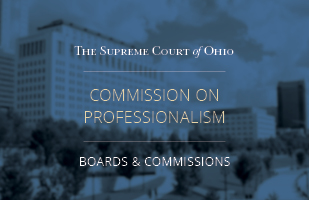Professionalism Commission: Setting Standards for Ohio’s Lawyers

As a way to enhance decorum in Ohio's legal profession, the Supreme Court established the professionalism commission in 1997.

As a way to enhance decorum in Ohio's legal profession, the Supreme Court established the professionalism commission in 1997.
Editor’s Note: This story is part of a series on the Ohio Supreme Court’s boards and commissions.
In Ohio, the ethical regulation of attorneys and judges is applied through a code of conduct that serves as a foundation for practicing the law and how to treat others connected to the profession.
While the Ohio Board of Professional Conduct oversees disciplining attorneys and judges for misconduct, the Ohio Supreme Court’s Commission on Professionalism is charged with monitoring, coordinating, and updating the ideals of the legal profession and sharing them with the state’s legal entities, such as courts, bar associations and law schools.
“It’s collegiality between attorneys and among attorneys, judicial officers, and clients,” said Brad Martinez, the Supreme Court’s liaison to the commission. “It’s about making sure that everybody is behaving in a civil manner.”
Created in 1997 due to general concerns about a lack of civility within the profession, the commission was established by Rule XV of the Supreme Court’s Rules for the Government of the Bar of Ohio.
The rule states that the commission’s purpose is to “devote its attention to the law as a profession and to maintaining the highest standards of integrity and honor among members of the profession.”
Producing and Promoting PrinciplesSince professionalism is encouraged in various ways throughout the legal profession, the commission’s focus is one part maintaining and updating guidelines and publications and one part publicizing and sponsoring activities and programs that emphasize and enhance professionalism fundamentals.
Some of the events and programs are Supreme Court initiatives directly overseen by the commission, such as the Student to Lawyer Symposium and the Lawyer to Lawyer Mentoring Program.
“The mentoring program is a great thing holistically as far as networking opportunities and getting a sense of what being a lawyer is like,” said Martinez, a former mentee and current mentor. “Ohio is well known for having one of the best mentoring programs in the country.”
Those avenues not only instill a greater understanding of appropriate lawyer and judicial conduct, but they also establish direct connections to peers who can provide insight about concerns that can be difficult to address within a firm or organization.
“There’s a dynamic where you’re working for somebody, and there are questions that you may be afraid to ask,” said Martinez. “These programs allow for more comfort to ask questions new attorneys wouldn’t ask of a supervisor or an employer.”
As part of its sponsorship at bar associations and other events, the commission provides publications and materials it produces as continuing legal education for licensed attorneys. For law schools, commission content can help with the development of student orientations, curricula, and new lawyer training programs to engrain professional ethics as early as possible.
Along with the Professional Ideals for Ohio Lawyers and Judges, the “Professionalism Do’s and Don’ts” series highlights best practices for a variety of topics, including legal writing, conduct in the courtroom, and working with opposing counsel and other lawyers.
The commission’s education efforts also extend to people in need of legal representation by providing an easy-to-understand guide about the attorney-client relationship, from acquiring a lawyer to finding out what to do if issues arise with a lawyer.
Related:
Character and Fitness: Review, Reinforce Reputation
As the legal profession evolves, so does the commission. These advances occur in response to changes in social norms and societal developments.
Greater awareness about race, culture, and gender identity has led to updates in the commission’s mentoring curriculum focusing on inclusivity in the legal realm.
When COVID-19 caused widespread, sudden changes to the practice of law, the commission responded by adopting ways for lawyers and judges to continue their professional growth through teleconferencing and on-demand learning.
“We’ve put together an exhaustive and responsive curriculum to adapt to the changes around us,” Martinez said.
The commission – comprised of 15 members – includes both lawyers and non-lawyers with diverse experiences. This brings varied perspectives to the group and encourages innovation. Five judges, six lawyers, two law school administrators or faculty members, and two non-attorneys make up the composition.
Nine members are appointed by the Supreme Court justices. The other six are attorneys designated by the Ohio State Bar Association and the Ohio Metropolitan Bar Association Consortium. Each person serves three-year terms and can be reappointed once.
During their quarterly meetings, the group constructs recommendations to the Court and others on methods to enhance professionalism through education and marketing.
Such suggestions could be revisions to larger doctrines, including the Ohio Rules of Professional Conduct and Ohio Code of Judicial Conduct; ways to advance pro bono participation to ensure justice is available for all; or illustrating professional and unprofessional behavior through the commission’s professionalism video series.
“The commission looks everywhere to continually bring dignity, integrity, and honor to the forefront of the legal profession,” Martinez said.Service on the Commission on Professionalism is one of the many ways an attorney can give back to the profession. The Commission on Professionalism, like other boards and commissions, has a need for volunteers to share in maintaining the integrity of the profession. The justices of the Ohio Supreme Court appoint some members of the commission and are always grateful for applications from those willing to serve.


